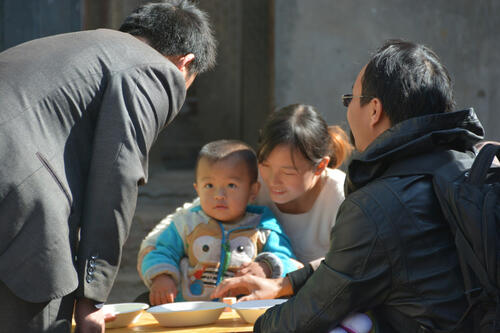Trainers: A Santa Qin and Honorary Godmother
Trainers: A Santa Qin and Honorary Godmother
The following two accounts by REAP researchers Wang Xiaohong and Jia Fang illustrate the immense dedication of two family planning workers from Shanyang County.
SHANYANG COUNTY – Every Wednesday, Qin Yulu takes the bus from the Gaobadian Township to Shitouliang Village, carrying a big red bag filled with toys. He is so regular with this weekly routine that even the local bus driver greets him by name and asks if he is going to play games with children again. Qin’s big red bag attracts a lot of attention on this bus route.
 These parenting trainers are propelled by thoughts of the children's recognition and trust when enduring tough travel conditions to reach their homes.
These parenting trainers are propelled by thoughts of the children's recognition and trust when enduring tough travel conditions to reach their homes.
|
|
Qin and Cai are propelled by the recognition and trust of the children they work with. |
Qin is not Santa; he is one of the 70 family planning workers REAP researchers recruited to implement a pilot in-home parental training program. Each parenting trainer is assigned to handle 1 to 4 households that they have to visit weekly, bringing new activities each time. Their mission is to guide parents or caregivers on how to engage with their toddlers by playing, singing or reading with them. Toys are left with the family at the end of each visit and collected the next time.
One of the children Qin is in charge of is Guo Xirui, whose father is a migrant worker and whose mother is a store clerk with a long commute to work. Because Guo’s mother gets home late, and because Guo’s grandmother is not in good health, Guo’s aunt mainly looks after him, along with his three older cousins. Being responsible for four children doesn’t leave the aunt much time to play with Guo. When Qin first visits Guo’s family, he teaches Guo’s aunt how to play that week’s activities, but they are pressed for time, and the aunt has to leave the house soon after.
Following that initial experience, Qin seeks out a way to involve the mother in the parenting activities, instead of the busy aunt. So he finds a time to stop by the store where the mother was working to show her how to use the toys and to walk her through the specifics and benefits of that week’s activities.
Qin’s extra effort pays off. After the mother learns about the program’s activities, she asks Guo’s aunt to bring the toddler to her store whenever Qin was to visit. Qin is thus able to guide Guo’s mother in doing the weekly activities with her son, and to explain how playing has an important role in different stages of child development.
In a follow-up phone call with REAP researchers, Guo’s mother says she could see in Guo a strong sense of identity beginning to form, and that every Tuesday, the boy would excitedly say, ‘My teacher will come tomorrow!’
**
In another region of Shanyang County, parenting trainer Cai Lijing must travel two hours by bus – one-way – to traverse 80 kilometers of serpentine roads from the Shuangping Township to a small mountain village to visit Tao Ruiqi, one of the children assigned to her. Her greatest challenge is getting there and back.
Chartering a car would be too expensive, and Cai’s only choice is the single bus that departs daily at 1:30pm from the county seat to the remote village. To catch this bus for her weekly visits, Cai must first quickly prepare lunch for her own elementary school-aged son and then rush to the bus stop. After two hours of winding along the long route, the bus finally reaches the village.
Little Ruiqi’s family lives in an earth brick home with only a few wooden stools as furnishings. The 2 ½-year-old girl has a newborn baby brother and lives with her grandparents and mother, who is very young and did not have much of a formal education. Her father spends most of the year working away from home. The one who spends the most time with Ruiqi is her illiterate grandmother.
When Cai arrives for her hourlong visit, she works with the mother and Ruiqi to find the previous week’s toy. Sometimes it takes a long time to find it and the toy is dirty. Cai doesn’t say anything about this but merely brings it back to her own home to sanitize. Cai is also shocked one day when she learns that Ruiqi – at 30-months-old – was still unable to feed herself. Cai then patiently shows Ruiqi how to use chopsticks and explains to the mother the importance of child nutrition, health and development.
After persevering for two months and investing an enormous amount of emotional energy, Cai sees Ruiqi transform from a shy child who wouldn’t look at her to one who would occasionally call her “mom.” Because there is no regular bus for Cai to take home, Ruiqi and her family would have to search the village for someone with a motorcycle who is willing take Cai all the way down the mountain. Often, people would refuse, even when offered money. When the situation gets desparate, little Ruiqi sometimes purposefully tells people that Cai, “her godmother” needs a ride. On those cold days, Cai’s heart grows warm upon hearing Ruiqi’s honorary term of endearment.
When asked what propels her to endure such difficult travel conditions, Cai smiles and replies that a child’ recognition and trust are her greatest reward.
“When I was busy and tired,” Cai says, “I often did not want to go. But I would think of Ruiqi’s hopeful expression every time we parted. Then I would feel that no matter how busy I was, I could not let a child down!”
